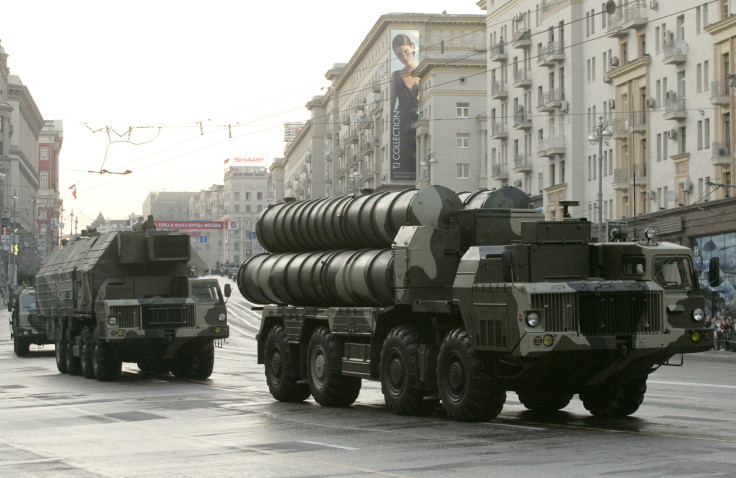Russia Sneaks S-300 Missiles Through Turkey's Bosporus Blockade As It Runs Short Of Missiles In Ukraine
KEY POINTS
- Russia used a civilian crewed cargo vessel to transport military cargo through the Bosporus strait
- The vessel is owned by Oboronlogistika, a firm sanctioned by the U.S.
- Russia action defies Turkish blockade under the Montreux Convention
- The missile system was moved from Syria
Despite Turkey's decision to block warships and military cargo from using the Bosporus strait, Russia is said to have sneaked advanced weapon systems, such as S-300 missile system, on a civilian cargo vessel from its base in Syria, through the Bosporus to the Black Sea region on the night of Aug. 24.
The S-300 likely came from a site at Masyaf in northern Syria and was gathered on the pier at Tartus on the Mediterranean coast of Syria, from where it is believed to have set sail via the Bosphorus to the Russian coast on the Black Sea, said a report in the Naval News. The decision to move the missile system back from Syria could be the result of a possible shortage of such systems that the Russian military is facing in its war in Ukraine.
The report further said that civilian crew operated Ro-Ro vessel Sparta II, sailing under the Russian flag and carrying military cargo, started its voyage on Aug. 20 and passed the Bosporus overnight on Aug. 24-25. After waiting at anchor near the Russian coast, the vessel pulled into Novorossiysk, a port city on the Black Sea in southern Russia, on Saturday.
The Bosphorus along with the Dardanelles, called the Turkish Straits, connect the Aegean and Mediterranean seas to the Black Sea. Under the Montreux Convention, Turkey has authority to control passage via the straits.
News reports quoted a tweet by Istanbul-based geopolitical analyst and ship-spotter Yörük Işık, on the transit. Işık runs the Bosphorus Observer analysing shipping activity on the Turkish Straits.
.@USTreasury designated [UKRAINE-EO13685], @mod_russia owned Oboronlogistika's, civilian crewed Russian flag roro Sparta II transited Bosphorus towards Med en route from #Tartus #Syria to Novorossiysk carrying military cargo. @egetulca pic.twitter.com/fsGlSfz4i8
— Yörük Işık (@YorukIsik) August 27, 2022
In a related tweet, ImageSat International, an Israeli intelligence company, revealed satellite images of what is said to be the redeployment of a Russian S-300 air defense battery from Masyaf in Syria.
#ISI reveals: Russian S-300 Air defense Battery DEPLOYED FROM #Syria to #Russia.
— ImageSat Intl. (@ImageSatIntl) August 28, 2022
Russian forces in Syria have deployed out of the country the S-300 SAM battery originally located Masyaf. pic.twitter.com/z5EG9nJDXF
The cargo vessel that through the strait is understood to be owned by Oboronlogistika, a company owned by the Russian Ministry of Defense. Notably, it is one of the Russian maritime-related firms designated for sanctions by the United States and added to the Treasury's Office of Foreign Assets Control (OFAC) sanctions list following the country's invasion of Ukraine. Russia calls its operations in Ukraine a "special military operation."
S-300 are long range surface-to-air missile systems. A report in The WarZone said Russia's decision to shift back its air defense system from Syria could be because of a shortage of missile systems. The report said the S-300 could also be used as guided missiles against Ukrainian ground targets. There have been reports in the past of Russia using S-300 missiles in that role in Ukraine.
Intelligence agencies in Ukraine have pointed out that Russians are also running low on two of their primary land-attack systems: the Kalibr cruise and Iskander ballistic missiles, which it has been using since the beginning of the war.
The narrow Bosporus strait is the only waterway which connects the Mediterranean with the Black Sea. Following the Russian invasion of Ukraine, Turkey invoked the 1936 Montreux Convention in March, denying Russian request to sail naval ships through the Turkish Straits. The convention gives Turkey the authority to control passage via the Bosporus and Dardanelles straits. The Turkish decision has impeded Russian efforts to mobilize its navy in the Black Sea, after the sinking of the Moskva.

© Copyright IBTimes 2024. All rights reserved.





















